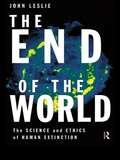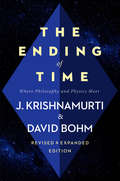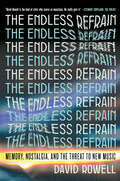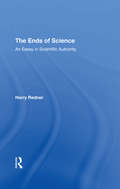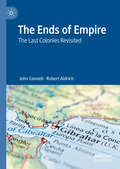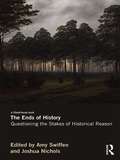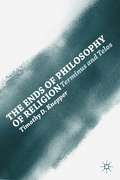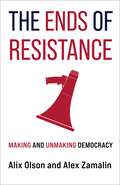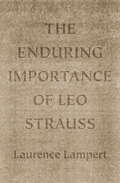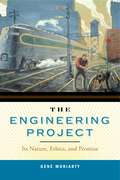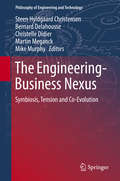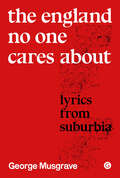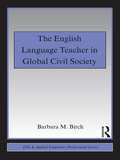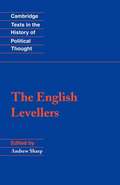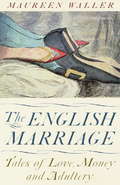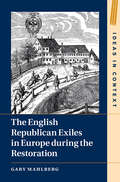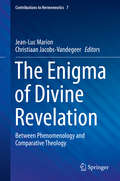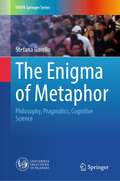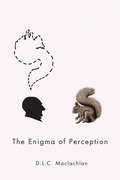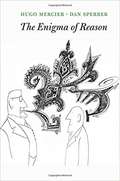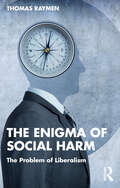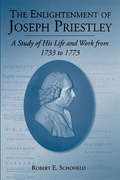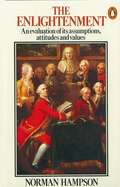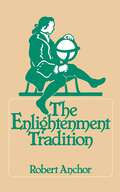- Table View
- List View
The End of the World: The Science and Ethics of Human Extinction
by John LeslieAre we in imminent danger of extinction? Yes, we probably are, argues John Leslie in his chilling account of the dangers facing the human race as we approach the second millenium. The End of the World is a sobering assessment of the many disasters that scientists have predicted and speculated on as leading to apocalypse. In the first comprehensive survey, potential catastrophes - ranging from deadly diseases to high-energy physics experiments - are explored to help us understand the risks. One of the greatest threats facing humankind, however, is the insurmountable fact that we are a relatively young species, a risk which is at the heart of the 'Doomsday Argument'. This argument, if correct, makes the dangers we face more serious than we could have ever imagined. This more than anything makes the arrogance and ignorance of politicians, and indeed philosophers, so disturbing as they continue to ignore the manifest dangers facing future generations.
The Ending of Time
by Jiddu KrishnamurtiSpirituality meets science as two of the greatest minds of our time come together to discuss essential issues of good and evil, thought and consciousness, and the nature of existence.The Ending of Time presents the fascinating conversations between two men from vastly different worlds: revered philosopher Jiddu Krishnamurti and renowned physicist David Bohm. Through deep exploration of the brain vs. the mind, the significance of death, and an individual's relationship to society, they debate the root of human conflict and what we can do about it. Revolutionary insights throughout these discussions reveal the potential for the ending of time to bring about a new beginning for humanity. wrong turn humanity has taken--a state that they argue can be corrected. Though they insist that mankind can change fundamentally, they warn that transformation requires going from one's narrow and particular interests toward the general, and ultimately moving still deeper into that purity of compassion, love and intelligence that originates beyond thought, time, and even emptiness.This updated edition, edited and revised in clear and engaging language, includes a new introduction and a conversation previously published separately which examines "The Future of Humanity."
The Endless Refrain: Memory, Nostalgia, and the Threat to New Music
by David RowellA veteran music journalist argues that the rise of music streaming and the consolidation of digital platforms is decimating the musical landscape, with dire consequences for the future of our culture …In The Endless Refrain, former Washington Post writer and editor David Rowell lays out how commercial and cultural forces have laid waste to the cultural ecosystems that have produced decades of great American music. From the scorched-earth demonetizing of artist revenue accomplished by Spotify and its ilk to the rise of dead artists &“touring&” via hologram, Rowell examines how a perfect storm of conditions have drained our shared musical landscape of vitality.Combining personal memoir, intimate on-the-ground reporting, industry research, and cultural criticism, Rowell&’s book is a powerful indictment of a music culture gone awry, driven by conformity and subverted by the ways the internet and media influence what we listen to and how we listen to it.
The Ends Of Science: An Essay In Scientific Authority
by Harry RednerIn this path-breaking and controversial book, Harry Redner provides a systematic study of how the epistemologically interesting features of contemporary science are to be understood. Taking “science†to include knowledge from the social sciences and humanities as well as the physical sciences, Redner shows how the history of science, philosophical theory, and current scientific research reveal connections between scientific developments and features of the social organization of science. Redner argues that the shift from Classical science to a more complex and less orderly World science after World War II has changed the way scientific research is done and how its knowledge is organized. His aim, however, “is not merely to interpret science, but to change it.†Thus, this examination is more than a survey and critique—it is a positive program for the development of future science. Remarkable for its breadth and insight, the book is especially valuable for its discussions of authority and social organization (with the accompanying themes of academic politics, competition, power, and corruption) and for its catalog of the various contemporary critiques of science. Some of these are European in origin and will be new to many U.S. readers. A tour de force on several levels, this book is essential reading for scientists, philosophers, sociologists of science, historians of ideas, critics of contemporary culture and, indeed, for anyone who takes a serious interest in scientific research and higher learning.
The Ends of Empire: The Last Colonies Revisited
by Robert Aldrich John ConnellThis book offers a fresh analysis of constitutional, economic, demographic and cultural developments in the overseas territories of Britain, France, the Netherlands, Denmark, Spain, the United States, Australia and New Zealand. Ranging from Greenland to Gibraltar, the Falklands to the Faroes, and encompassing islands in the Atlantic, Pacific and Indian Oceans, and the Caribbean, these territories command attention because of their unique status, and for the ways that they occasionally become flashpoints for rival international claims, dubious financial activities, illegal migration and clashes between metropolitan and local mores. Connell and Aldrich argue that a negotiated dependency brings greater benefits to these territories than might independence.
The Ends of History: Questioning the Stakes of Historical Reason (Laurier Studies In Political Philosophy Ser. #1)
by Amy Swiffen Joshua NicholsThe Ends of History? considers how, despite the fact that events in the past 20 years have called Francis Fukuyama’s infamous announcement of the end of history into question, the issue of the end of history is now a matter of renewed interest and debate. Two decades ago we were confronted by the end of the Soviet Union and collapse of the geo-political divisions that had defined much of the twentieth century. From this particular end, the ‘end of history’ was proclaimed. But is it still possible to argue that liberal democracy and free market capitalism are the final form of law and mode of production in human history? Recent events have called this thesis into question: from 9/11 and the War on Terror, to the current global economic collapse and looming ecological crises, it seems that history if far from over. And yet, oddly enough, the question of ‘the end’ has returned. For example, in the often predicted, but still uncertain, establishment of either a new international American Empire or a new era of International Law, and the global resurgence of religion as a dominant source of political identification. On the other hand, perhaps the ‘end’ is still yet to come, slowly accumulating, mustering at the periphery of the geo-political landscape and outside the productive sphere. Responses taking up these questions range from a return to Universalism, political theology, Messianism, and even the old specter of communism. This volume assesses these responses, exploring what is at stake in proclaiming ‘the end’ in the current historical moment. Is it a matter of reading the writing on the wall? Or is the proclamation itself a political act? Furthermore is there a desire for the ‘end’? In addressing these questions, the contributors to The Ends of History? confront the various ‘ends’ that we now live, and in so doing they open new lines of sight into the future.
The Ends of Philosophy of Religion, Terminus and Telos
by Timothy D. KnepperKnepper criticizes existing efforts in the philosophy of religion for being out of step with, and therefore useless to, the academic study of religion, then forwards a new program for philosophy of religion that is in step with, and therefore useful to, the academic study of religion.
The Ends of Resistance: Making and Unmaking Democracy
by Alix Olson Alex ZamalinSince the rise of Donald Trump and other right-wing authoritarians worldwide, we have been told to “resist.” But this kind of opposition looks surprisingly like restoring the status quo. Under the banner of resistance, liberals and progressives have encouraged voting for Democrats, reading the mainstream media, trusting the science, putting up yard signs, buying the right products, and celebrating a “return to normal.” How was “resistance” diluted, and where can we find alternative forms of resistance for present and future struggles?Alix Olson and Alex Zamalin offer a clear-eyed critical account of how neoliberalism has redefined resistance to thwart social movements and consolidate power. Elites have domesticated and coopted some once-radical concepts and practices into “restorative resistance” that bolsters support for an unjust social order while marginalizing, racializing, and criminalizing many others. Olson and Zamalin argue that true resistance to racial neoliberalism must instead be deeply antirestorative: collective, horizontal, counterhegemonic, radically democratic insurrectionary movements that cannot be redirected into shoring up the existing order. This “unruly world-building”—exemplified by Occupy Wall Street, the Movement for Black Lives, Indigenous activism at Standing Rock, and more—pushes us to live, think, and dream beyond profit maximization, democratic civility, and individual freedom. Powerfully and accessibly written with manifesto-like urgency, The Ends of Resistance shows how marginalized voices and social movements deepen our thinking for confronting power.
The Enduring Importance of Leo Strauss
by Laurence Lampert"The Enduring Importance of Leo Strauss" takes on the crucial task of separating what is truly important in the work of Leo Strauss from the ephemeral politics associated with his school. Laurence Lampert focuses on exotericism: the use of artful rhetoric to simultaneously communicate a socially responsible message to the public at large and a more radical message of philosophic truth to a smaller, more intellectually inclined audience. Largely forgotten after the Enlightenment, exotericism, he shows, deeply informed Strauss both as a reader and as a philosophic writer indeed, Lampert argues, Strauss learned from the finest practitioners of exoteric writing how to become one himself. Examining some of Strauss s most important books and essays through this exoteric lens, Lampert reevaluates not only Strauss but the philosophers from Plato to Halevi to Nietzsche with whom Strauss most deeply engaged. Ultimately Lampert shows that Strauss s famous distinction between ancient and modern thinkers is primarily rhetorical, one of the great examples of Strauss s exoteric craft. Celebrating Strauss s achievements while recognizing one main shortcoming unlike Nietzsche, he failed to appreciate the ramifications of modern natural science for philosophy and its public presentation Lampert illuminates Strauss as having even greater philosophic importance than we have thought before. "
The Engineering Project: Its Nature, Ethics, and Promise
by Gene MoriartyWe all live our daily lives surrounded by the products of technology that make what we do simpler, faster, and more efficient. These are benefits we often just take for granted. But at the same time, as these products disburden us of unwanted tasks that consumed much time and effort in earlier eras, many of them also leave us more disengaged from our natural and even human surroundings. It is the task of what Gene Moriarty calls focal engineering to create products that will achieve a balance between disburdenment and engagement: “How much disburdenment will be appropriate while still permitting an engagement that enriches one’s life, elevates the spirit, and calls forth a good life in a convivial society?”One of his examples of a focally engineered structure is the Golden Gate Bridge, which “draws people to it, enlivens and elevates the human spirit, and resonates with the world of its congenial setting. Humans, bridge, and world are in tune.” These values of engagement, enlivenment, and resonance are key to the normative approach Moriarty brings to the profession of engineering, which traditionally has focused mainly on technical measures of evaluation such as efficiency, productivity, objectivity, and precision. These measures, while important, look at the engineered product in a local and limited sense. But “from a broader perspective, what is locally benign may present serious moral problems,” undermining “social justice, environmental sustainability, and health and safety of affected parties.” It is this broader perspective that is championed by focal engineering, the subject of Part III of the book, which Moriarty contrasts with “modern” engineering in Part I and “pre-modern” engineering in Part II.
The Engineering-Business Nexus: Symbiosis, Tension and Co-Evolution (Philosophy of Engineering and Technology #32)
by Steen Hyldgaard Christensen Christelle Didier Martin Meganck Mike Murphy Bernard DelahousseFascinating and compelling in equal measure this volume presents a critical examination of the multilayered relationships between engineering and business. In so doing the study also stimulates ethical reflection on how these relationships either enhance or inhibit strategies to address vital issues of our time. In the context of geopolitical, economic, and environmental tendencies the authors explore the world that we should want to create and the role of the engineer and the business manager in this endeavor. Throughout this volume the authors identify periods of alignment and periods of tension between engineering and business. They look at focal points of the engineering-business nexus related to the development of capitalism. The book explores past and present movements to reshape, reform, or reject this nexus.The volume is informed by questions of importance for industry as well as for higher education. These are: What kinds of conflict arise for engineers in their attempts to straddle both professional and organizational commitments? How should professionals be managed to avoid a clash of managerial and professional cultures? How do engineers create value in firms and corporations? What kinds of tension exist between higher education and industry? What challenges does the neoliberal entrepreneurial university pose for management, faculty, students, society, and industry? Should engineering graduates be ready for work, and can they possibly be? What kinds of business issues are reflected in engineering education curricula, and for what purpose? Is there a limit to the degree of business hybridization in engineering degree programs, and if so, what would be the criterion for its definition? Is there a place in engineering education curricula for reflective critique of assumptions related to business and economic thinking? One ideal of management and control comes to the fore as the Anthropocene - the world transformed into an engineered artefact which includes human existence. The volume raises the question as to how engineering and business together should be considered, given the fact that the current engineering-business nexus remains embedded within an economic model of continual growth. By addressing macro-level issues such as energy policy, sustainable development, globalization, and social justice this study will both help create awareness and stimulate development of self-knowledge among practitioners, educators, and students thereby ultimately addressing the need for better informed citizens to safeguard planet Earth as a human life supporting system.
The England No One Cares About: Lyrics from Suburbia (Goldsmiths Press / Sonics Series)
by George MusgraveAn exploration of the much-derided English suburbs through rap music.There are many different Englands. From the much-romanticized rolling countryside, to the cosmopolitanism of the inner cities (embraced by some as progressive, multicultural enlightenment and derided by others as the playground of a self-righteous metropolitan elite), or the disparagingly named "left behind" communities which, post-Brexit, have so interested political parties and pundits, demographers and statisticians.But there is also an England no one cares about. The England of semi-detached houses and clean driveways for multiple cars devotedly washed on Sundays, of "twitching curtains" and Laura Ashley sofas; of cul-de-sacs to nowhere and exaggerated accents; of late night drives to petrol stations on A roads, fake IDs tested in Harvesters, and faded tracksuits and over-gelled hair in Toby Carverys; of questionable hash from a "mate of a mate" and two-litre bottles of White Lightning from Budgens consumed in a kids playground. Much derided. Unglamorous, ordinary; cultural vacuity and small "c" conservatism. A hodgepodge. An—apparently—middling, middle-of-the-road middle-England of middle-class middle-mindedness. Part poetry anthology, part academic study into placemaking, and part autoethnography, The England No One Cares About innovatively brings together academic discussions of the ethnographic potential of lyrics, scholastic representations of suburbia, and thematic analysis to explore how rap music can illuminate the experiences of young men growing up in suburbia. This takes place by exploring the author&’s own annotated lyrics from his career as a musician known as Context where he was referred to by the BBC as "Middle England&’s Poet Laureate."
The English Language Teacher in Global Civil Society (ESL & Applied Linguistics Professional Series)
by Barbara M. BirchHow can English language teachers contribute to peace locally and globally? English language teachers and learners are located in the global civil society – an international network of civil organizations and NGOs related to human rights, the environment, and sustainable peace. English, with its special role as an international language, is a major tool for communication within this network. On the local level, many teachers are interested in promoting reconciliation and sustainable peace, but often do not know how to do so. This book provides information, analysis, and techniques to help teachers around the world take action toward this goal. Balancing, in a readable and accessible way, the global and the local, core and periphery, cultural diffusion and resistance, theory and practice, pessimism and optimism, outsider and insider perspectives, the expert role and the apprentice role, and prescriptive and elicitive methods, it offers an alternative to literature about critical applied linguistics, globalization, and peace education that is simply too complex and wordy to spread easily from theoretician to the classroom teacher. The English Teacher in Global Civil Society: synthesizes threads from many fields and topics into a coherent and empowering argument for the activist role English language teachers can take to promote social change draws on humanistic education, peace education, cross-cultural understanding, problem-posing, cooperative learning, and critical thinking methodologies to help English language teachers learn how to teach conflict resolution skills in their classrooms covers issues in critical applied linguistics, approaches and methodologies in ESL/EFL, global and local curricular issues, and specific skill areas such reading, writing, and speaking suggests a new goal for English language teachers: global citizenship. This engaging, informative, provocative, and highly readable book is a welcome resource for English language teacher trainers, pre-service teachers, practicing classroom teachers, and Peace Corps workers around the world.
The English Levellers
by Andrew SharpThe levellers were a crucial component of a radically democratic movement that came together during the English civil wars. Much leveller activity occurred in print and their texts now form an important part of the liberal and social democratic canon. This edition contains an introduction by the editor that sets the leveller ideas in their context and, together with a chronology and short biographies of the leading figures, is essential reading for students of the English civil wars and the history of political thought.
The English Marriage
by Maureen WallerThe story of the English marriage is unique and eccentric. Long after the rest of Europe and neighbouring Scotland had reformed their marriage laws, England clung to the chaotic and contradictory laws of the medieval Church, making it all too easy to enter into a marriage but virtually impossible to end an unhappy one. If England was a 'paradise for wives' it could only have been through the feistiness of the women. Married women were placed in the same legal category as lunatics. While Englishmen prided themselves on their devotion to liberty, their wives were no freer than slaves. It was a husband's jealously guarded right to beat his wife, as long as the stick was no bigger than his thumb. Only after 1882 could a married woman even retain her own property. But then marriage was all about property in a society which was both mercenary and violent, where a girl was virtually sold into marriage and a price was put on a wife's chastity. With a cast of hundreds, from loyal and devoted wives in troubled times to those who featured in notorious trials for adultery, from abusive husbands whose excesses were only gradually curbed by the law to the modern phenomenon of the toxic wife, acclaimed historian Maureen Waller draws on intimate letters, diaries, court documents and advice books to trace the evolution of the English marriage. It is social history at its most revealing, astonishing and entertaining.
The English Marriage
by Maureen WallerThe story of the English marriage is unique and eccentric. Long after the rest of Europe and neighbouring Scotland had reformed their marriage laws, England clung to the chaotic and contradictory laws of the medieval Church, making it all too easy to enter into a marriage but virtually impossible to end an unhappy one. If England was a 'paradise for wives' it could only have been through the feistiness of the women. Married women were placed in the same legal category as lunatics. While Englishmen prided themselves on their devotion to liberty, their wives were no freer than slaves. It was a husband's jealously guarded right to beat his wife, as long as the stick was no bigger than his thumb. Only after 1882 could a married woman even retain her own property. But then marriage was all about property in a society which was both mercenary and violent, where a girl was virtually sold into marriage and a price was put on a wife's chastity. With a cast of hundreds, from loyal and devoted wives in troubled times to those who featured in notorious trials for adultery, from abusive husbands whose excesses were only gradually curbed by the law to the modern phenomenon of the toxic wife, acclaimed historian Maureen Waller draws on intimate letters, diaries, court documents and advice books to trace the evolution of the English marriage. It is social history at its most revealing, astonishing and entertaining.
The English Republican Exiles in Europe during the Restoration (Ideas in Context)
by Gaby MahlbergThe Restoration of the Stuart monarchy in 1660 changed the lives of English republicans for good. Despite the Declaration of Breda, where Charles II promised to forgive those who had acted against his father and the monarchy during the Civil War and Interregnum, opponents of the Stuart regime felt unsafe, and many were actively persecuted. Nevertheless, their ideas lived on in the political underground of England and in the exile networks they created abroad. While much of the historiography of English republicanism has focused on the British Isles and the legacy of the English Revolution in the American colonies, this study traces the lives, ideas and networks of three seventeenth-century English republicans who left England for the European continent after the Restoration. Based on sources from a range of English and continental European archives, Gaby Mahlberg explores the lived experiences of these three exiles - Edmund Ludlow in Switzerland, Henry Neville in Italy, and Algernon Sidney - for a truly transnational perspective on early modern English republicanism.
The Enigma of Divine Revelation: Between Phenomenology and Comparative Theology (Contributions to Hermeneutics #7)
by Jean-Luc Marion Christiaan Jacobs-VandegeerThis volume explores the possibilities and pressures of the language of revelation on human understanding. How can we critically account for divine self-disclosure in the linguistically mediated world of human concerns? Does the structure of interpretation limit the language of revelation? Does revelation open up new horizons of critical interpretation? The volume brings together theologians who approach the interactions of revelation and hermeneutics with different perspectives, including various forms of phenomenology and comparative theology. It approaches the theme of revelation – central as it is to the theological endeavour – from several angles rather than a single methodological program. Dealing as it does with revelation and understanding, the volume addresses the foundational issues at stake in the challenges around change, identity, and faithfulness currently facing the church.
The Enigma of Metaphor: Philosophy, Pragmatics, Cognitive Science (UNIPA Springer Series)
by Stefana GarelloThis book deals with the complicated realm of metaphor, an enigma deeply embedded in language and cognition. There has been much discussion of metaphor in the past, but it was characterized by a certain fragmentation and lacked interdisciplinarity. In this field of study, the dominance of Cognitive Linguistics, epitomized by the Conceptual Metaphor Theory of George Lakoff and Mark Johnson, has caused the marginalization of alternative perspectives. To fill this gap, this book embarks on an interdisciplinary journey, inviting different theoretical frameworks to engage in a fruitful dialog. It navigates the labyrinth of theories and illuminates the nuanced facets of metaphor.At the center of this exploration are three central questions: whether metaphor belongs to the realm of style or thought, the intricate interplays between literal and metaphorical meanings and the integration of propositional and non-propositional elements in the construction of metaphorical meaning.Through a careful blend of historical analysis and contemporary hypotheses, the book unravels the complexities of metaphor, considering its evolution across the centuries and the myriad interpretations it evokes. By bringing together work from different fields, it ultimately shows that a definition of metaphor is theory-dependent and that metaphor is not a natural kind, but a complex and multifaceted philosophical concept whose study requires a multi-dimensional approach that transcends narrow theoretical boundaries. In this way, the book explores these considerations’ most important philosophical consequences and offers new insights into this fundamental aspect of human language.
The Enigma of Perception
by D. L. C. MaclachlanHow do we acquire knowledge through a sensory input from our environment? In The Enigma of Perception, D.L.C. Maclachlan revives the traditional causal representative theory of perception which dominated philosophical thinking for hundreds of years by revealing the important element of truth the theory contained. The traditional theory was not a complete explanation of perception, because it presupposed a causal system including both the physical objects and the subjective experiences. The pattern of inference from sensations to external objects, which lies at its heart, is nevertheless legitimate, because the assumptions on which it depends are generally recognized as true. The emerging enigma is how to explain this original knowledge of the world on which the traditional theory depends. The key idea is that sense experience is constructed as a response to sensory input - an act whose purpose is to represent a reality beyond the cognitive subject. The Enigma of Perception develops original ideas to explain this process in detail, with help from numerous philosophers from John Locke to David Chalmers.
The Enigma of Reason
by Hugo MercierIf reason is so useful and reliable, why didn’t it evolve in other animals and why do humans produce so much thoroughly reasoned nonsense? Hugo Mercier and Dan Sperber argue that reason is not geared to solitary use. It evolved to help justify our beliefs to others, evaluate their arguments, and better exploit our uniquely rich social environment.
The Enigma of Social Harm: The Problem of Liberalism
by Thomas RaymenDrawing on a novel blend of moral philosophy, social science, psychoanalytic theory and continental philosophy, this book offers up a diagnosis of contemporary liberal capitalist society and the increasingly febrile culture we occupy when it comes to matters of harm. On what basis can we say that something is harmful? How are we supposed to judge between competing opinions on the harmfulness of a particular behaviour, practice, or industry? Can we avoid drifting off into relativism when it comes to judgements about harm? In an age of deep cultural and political discord about what is and is not harmful, providing answers to such questions is more important than ever. Appraising the current state of the concept of social harm in academic scholarship and every-day life, Thomas Raymen finds a concept in an underdeveloped state of disorder, trapped in interminable deadlocks and shrill disagreements about what should and should not be considered harmful. To explain the genesis of this conceptual crisis and identify what we need to do to resolve it, The Enigma of Social Harm travels from Graeco-Roman antiquity to the present day, exploring trends and developments in moral and political philosophy, religion, law, political economy, and culture. Along the way, we see how such trends and developments have not only made it more difficult to establish a shared basis for evaluating harm, but that the tools which might enable us to do so are now outright prohibited by the political-economic, cultural, and ethical ideology of liberalism that dominates contemporary society. Written in a clear and accessible style, it is essential reading for all those interested in matters of social harm, justice, politics, and ethics.
The Enlightened Joseph Priestley: A Study of His Life and Work from 1733 to 1773
by Robert SchofieldJoseph Priestley (1733–1804) is one of the major figures of the English Enlightenment. A contemporary and friend of Benjamin Franklin and Thomas Jefferson, he exceeded even these polymaths in the breadth of his curiosity and learning. Yet no one has attempted an all-inclusive biography of Priestley, probably because he was simply too many persons for anyone easily to comprehend in a single study. Robert Schofield has devoted a lifetime of scholarship to this task. The result is a magisterial book, covering the life and works of Priestley during the critical first forty years of his life. <P><P>Although Priestley is best known as a chemist, this book is considerably more than a study in the history of science. As any good biographer must, Schofield has thoroughly studied the many activities in which Priestley was engaged. Among them are theology, electricity, chemistry, politics, English grammar, rhetoric, and educational philosophy. Schofield situates Priestley, the provincial dissenter, within the social, political, and intellectual contexts of his day and examines all the works Priestley wrote and published during this period. <P><P>Schofield singles out the first forty years of Priestley's life because these were the years of preparation and trial during which Priestley qualified for the achievements that were to make him famous. The discovery of oxygen, the defenses of Unitarianism, and the political liberalism that characterize the mature Priestley—all are foreshadowed in the young Priestley. A brief epilogue looks ahead to the next thirty years when Priestley was forced out of England and settled in Pennsylvania, the subject of Schofield's next book. But this volume stands alone as the definitive study of the making of Joseph Priestley.
The Enlightenment
by Norman HampsonArmed with the insights of the scientific revolution, the men of the Enlightenment set out to free mankind from its age-old cocoon of pessimism and superstition and establish a more reasonable world of experiment and progress. Yet by the 1760s, this optimism about man and society had almost evaporated. In the works of Rousseau, Kant and Goethe, there was discernible a new inner voice, and an awareness of individual uniqueness which had eluded their more self-confident predecessors. The stage was set for the revolutionary crisis and the rise of Romanticism. In this book, Norman Hampson follows through certain dominant themes in the Enlightenment, and describes the contemporary social and political climate, in which ideas could travel from the salons of Paris to the court of Catherine the Great - but less easily from a master to his servant. On such vexed issues as the role of ideas in the "rise of the middle class" he provides a new and realistic approach linking intellectual and social history.
The Enlightenment Tradition
by Robert AnchorThis synoptic survey examines critically the origins, development, decline, and historical significance of the European Enlightenment. The underlying theme of the inquiry is the real and possible relevance of the Enlightenment tradition to contemporary Western society.
